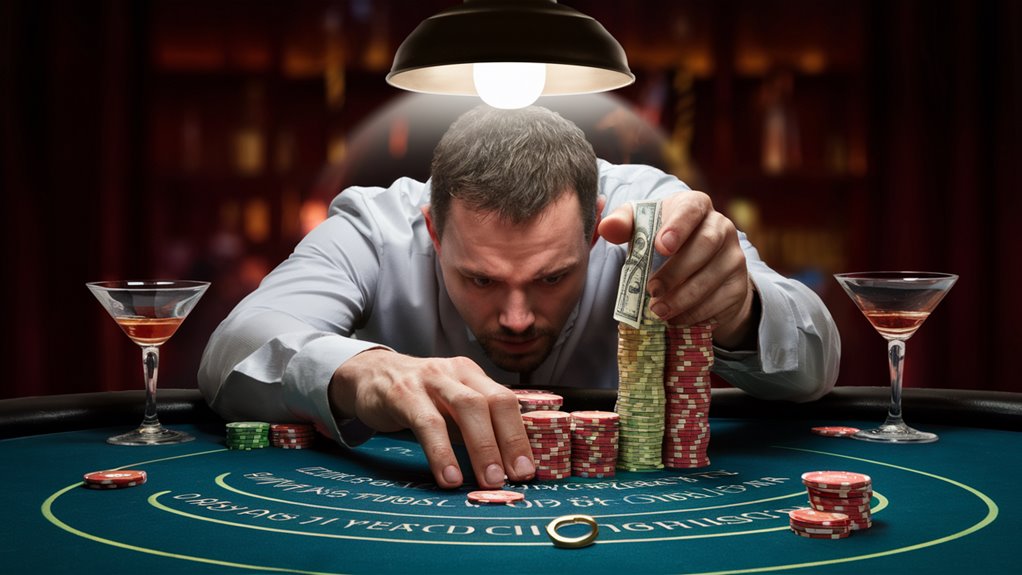
The Most Common Gambling Mistakes to Avoid
Key Gambling Mistakes – Don’t Make These Errors
Gambling Hazard Areas: Being on the Alert
Responsible gambling is based on not falling victim to serious errors that will destroy the quality of playing. Worse than this, however, is to disrupt the trend by playing without defined bankroll limits, i.e. your salvation in case you find yourself again topping out in pain and sorrow with no escape route left free of certain injury into the past seven years or Dalton ’76 ’77 all back around again for anything but regret once more life fails to offer renewal credits under current conditions. Emotional gambling can enable a win to turn into a loss in no time at all.
Elementary Bankroll Management
It’s the first step to disciplined gambling. By maintaining a firm bankroll strategy, mistakes are prevented, emergency expenses curtailed, and balance will always be maintained. For this purpose though, you have to keep track of every bet, winning and losing moment–otherwise, you tend to lose sight entirely of what kind of pattern your gambling behavior is taking.
Mathematics and House Edge
Proper decision-making requires understanding the points of profit (house edge) that games carry. For there is none in a casino that does not have an advantage to itself. This means that you need to have as your frame of reference:
Calculations on rate of return needed for profitability
Odds you don’t want
Take responsibility for any bets you make. Don’t place wagers without actually making money.
Emotional Control of Gambling
Avoiding emotional gambling is essential to self-restraint. You should never gamble when:
- Depressed
- Drunk
- To try and recoup a loss
- With money you have borrowed
- You are desperate for the win
Use Record-Keeping To Win
Review your gambling in totality to help track:
Effortlessly; all spending
Your habits use identifiable patterns
Staying within the limits of your budget
This will help give you better control over your gambling tendencies and may also warn you of possible problems which could arise if left uncorrected.
Decision Making: The Right Path
Use the guidelines of evidential success to help protect yourself:
- Set clear stop-loss limits for your gambling sessions of betting time and then observe them
- Don’t waste time chasing losses gambled away on previous runs
- Study game strategies thoroughly
- Only Put At Risk Money That Can Be Used For Fun.
Don’t allow mistakes to ruin better control over your gambling activities and a sounder judgment of them than would otherwise have occurred.
Keeping No Bankroll Recording System
Creating a Rational Approach to Setting Gambling Budgets
The Ultimate Realistic Spending Strategy
Before any gaming session begins, responsible gambling actually begins with setting clear financial boundaries.
Maintaining firmly implemented financial constraints is a basic tactic for management and avoiding financial difficulties.
Having made these all-important decisions ahead of time will enable logical thinking, free from the emotional biases that frequently accompany a casino.
Effective Budget Management Techniques
The best way to allocate one’s strategic budget is by dividing your overall gambling capital into manageable parts.
For example, a monthly gambling budget of $300 might be divided into six distinct $50 sessions.
This methodical method lets you closely track how your money is being spent and maximize the amount of fun you will get out of it while at the same time managing your finances.
Dividing Your Gambling Money
Different things must be kept separate from each other: Financial segregation is absolutely essential, with dedicated gaming funds held apart from all other necessities of life such as:
- Bills paid every month
- Living expenses
- Savings for when things go wrong
- Whatever dividends your investments might generate.
Therefore, you need a specially defined gaming card and or cash to use in the casino.
The most important level of control can be found in sticking with agreed-upon limits: as long as your funds are exhausted, do not carry on gaming.
Desperately Chasing Losses
Loss Avoidance and Management
What are you really gambling if not your own self-given time?
It is said that the greatest sin these days is not loss chasing but it.
The Psychology of Chasing Losses
Terrible gambling losses
Even before they reach this terrible phase, many players have already shown signs of risk behavior never seen before.
Impact of Loss Chasing Behavior
When people allow themselves to gamble after they have lost, their behavior usually includes many risky behaviors:
- Raising the bar on stake size
- The continuous staging of sessions in order to gamble out debts
- Raiding savings funds or online accounts
- Borrowing money in order to continue betting
Breaking the Cycle
Probability and Independent Events
Each gambling event operates independently of previous outcomes. Each gaming function is independent of the result of what has gone before and cannot affect the follow-up one way or another.
The House Edge remains constant irrespective of past results, and so it is mathematically impossible to recover losses incurred during playing one session or even many thousands of sessions.
Discourse On Protective Measures
Strategy and Tactics for Avoiding Loss
When it comes to healthy gaming, essential risk management strategies include:
- Establishing strict stop-loss limits
- Setting definite time frames, within which you must win or lose whatever you play for
- Running a separate gaming fund
- Recording all of your game activities
Prevention and Recovery
When you see indications of your playing causing issues, take immediate action.
Getting Started with a Responsible Attitude
Towards responsible play can The Rise of The Psychology Behind Casino Design and Layout Social Casinos begin early, starting from your second bad loss. When losses occur, accept them as an inevitable part of casino life and be as tolerant about them as necessary to keep on playing comfortably.
So before you can face up to crossing the questionable lines of division, you ought to be split into, but morally—and this is a matter you must decide for yourself—responsible gaming requires strict limits and the kind of self-control necessary to quit goodness and merit after these limits have been reached.
Patent Loss-Fighting Measures
- Set clear financial limits
- Use cooling-off periods to break up your playing sessions, dividing a few awkward minutes with a former running mate
- Paying strict attention to bankroll management
- Entertainment is the priority, not profit.
Where Knowledge Exceeds Understanding
Casino House Edge: The Importance of Details
Currently Of A Mathematical Centralization.
The House Edge is a Human Attitude.
Understanding the advantage built into the house is critical to practicing responsible gaming and finding ways to avoid loss altogether.
Every casino gambling game contains an inherent mathematical advantage that favors the house, and hence it is incumbent upon players to make educated decisions on gaming.
Responsible Companies, Fortunate Customers
This built-in edge allows the casino to make a profit through steady player turnover.
House Edge by Game Type
Games Population-Adjusted Distributions
All games now have different house edges and different distributions; consequently, all casinos are not created equal.
- One-deck blackjack: 0.5% house advantage
- Slot machines: 2-15% variable edge
- American roulette: 5.26% house advantage
- European roulette: 2.7% house advantage

Players’ Strategic Options
The Edge of the House is an inescapable element in gaming mathematics.
Rather than try to ignore this hard fact of statistics, people should work it into their bankroll-manage plan.
Understanding these percentages enables:
- Informed game selection
- Playing time extended with an expected average time of 0.5 hours
Realistic Expectations as to Game Results
Protection Against Losing in the Long Run
This mathematical framework acts as an extremely effective preventative against the delusion that the more one gambles, the better chance they have of overcoming statistical odds.
Gambling with Impairment of Other Sorts
Gambling When You’re Drunk
Hazard of Drinking and Gambling
When alcohol and gambling meet.
Drinking during gambling activities presents many hazards to consumers from the standpoints of decision-making and financial management itself.
From drink comes impairment of mental judgment; bets get bigger, and buying is increasingly difficult.
Alcohol-induced studies have shown that characteristics include:
- Reduced inhibition levels
- Increased readiness to take risks
- More bets
- Larger wagers
Safety Procedures and Preventive Measures
It is widely accepted in the gaming circles that drinking and betting do not go hand in hand.
Steel in the evening provides opportunities The Most Common Gambling How to Recognize and Overcome Gambling Addiction Scams and How to Avoid Them for such public service-oriented pitying as:
- Set a strict limit before you drink on how much to bet.
- Leave your credit card in the hands of staff you trust.
- Keep close track of the time and amount you spend wagering.
- Be conscious at all times of how much you are losing overall amid encroaching signals that cause you to forget about this fundamental precept.
The Casino Climate and Services for Drink
Gaming houses generally just offer glasses to customers under the misguided notion that an intoxicated player often:
- Makes greater bets
- Gambles for long periods of time
- Makes riskier decisions
- Displays diminished inhibition
Good Gambling Habits
Try the following measures as a safeguard for your gambling judgment:
- Only drink non-alcoholic beverages
- Measure your own degree of impairment
- Leave immediately when you feel that you’re having trouble remaining reasonable
Remember in matters of strategic decision-making, sharp thinking is a must.
In the Betting Area Mixed Feelings
Emotions and Decision-Making in Betting
The Emotional Impact of Betting
In gambling, emotional choices could produce bleak results when measured by taking great risks and enduring the kind of losses that make one wish they had never begun.
Violent emotional states such as anger, despair, or wild enthusiasm directly hit cognitive function and strategic thinking in making impulsive betting decisions.
The Perils of Emotional Betting
Loss-chasing behavior evolves into one of the more threatening chronic problems.
Escalated emotional states make an already dangerous habit even worse.
The frustration of losing often leads to bigger, unplanned bets—like those attempted to quickly recoup losses.
Winning can have the same effect. If you are confident, then you might make excessively large bets and neglect proper bankroll management.
Effective Strategies to Keep Emotions in Check
Self-Assessment Process
Perform a self-evaluation for feelings of exuberance and confidence before making a bet. This step can safeguard against erratic decisions in gambling by making you stop to think: How am I feeling right now?
Keeping Track of Strategies
Are Appropriate Gambling Tactics
Good betting strategy is marked by: 카지노사이트
- Strategic emotional management techniques with the aim of ensuring the highest chances for success in betting
- Clear-headed decision making
- Appropriate use of evidence
- Sound judgments
Maintaining a Disciplined Betting Approach
Keeping a disciplined, rather than reactionary, approach to gambling means:
- Monitoring one’s emotional state at all times
- A disciplined approach and cool-off period for betting decisions are better than being in a reactive mode
- Observe those predetermined bet size limits
Using a methodical professional approach ensures that one’s decisions are based in strategy rather than emotional impulse, thus maximizing the potential for favorable outcomes.
Failing to Keep Record of Results
Recording Bets is Particularly Important
Understand Result Tracking Basics
Tracking systematically the results of betting represents one fundamental cornerstone to responsible gambling. While many bettors overlook this essential discipline, proper tracking is the only foolproof method of understanding authentic gambling performance.
Contrary to what you might think just by using intuition, the human memory is an extremely unreliable indicator. Overestimating wins and devaluing losses or even entirely forgetting them entirely becomes its standard operating procedure.
Building Effective Tracking Systems
A comprehensive tracking system necessitates the creation and maintenance of detailed records on paper or in an electronic format like Excel: essential data points are as follows:
- Bet date and time
- Stake
- Type or method of bet and odds
- Final result
- Duration of session
- Emotional state
Using tracking for risk management
Regularly checking statistics that have been recorded defeats hazards at a stage, this would otherwise develop into more serious consequences.
- Stakes have been raised after losses.
- Under stress, bets fall into a cycle of ever-greater frequency.
- Away from normal patterns and rules for betting.
- Specific bet types show a minus return on investment (ROI).
Such an analytical method enables a gambler to modify his strategies and still remain involved in gambling.

